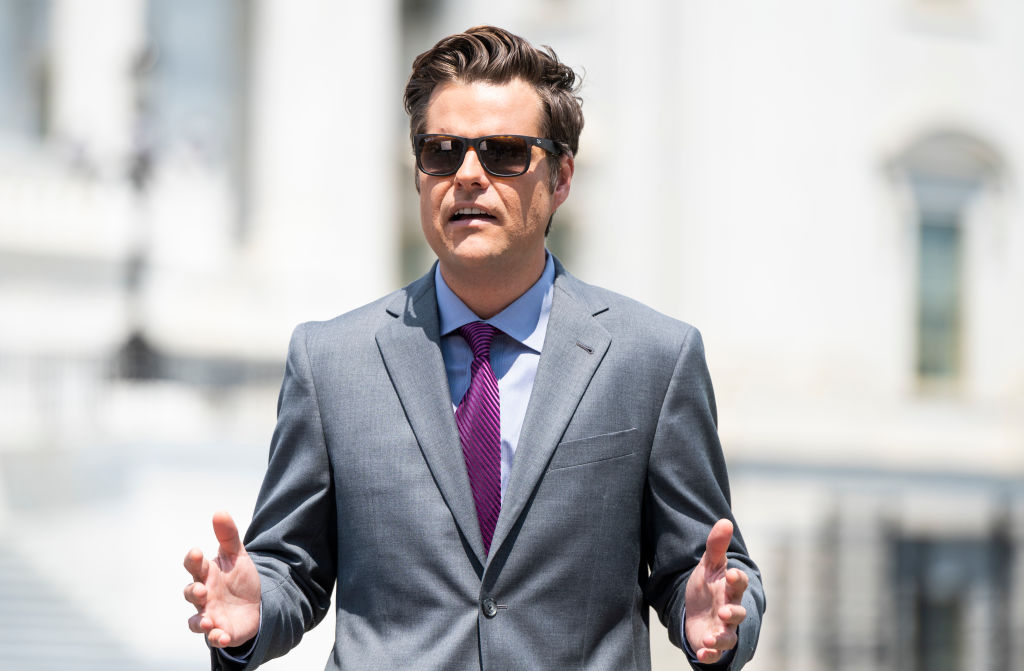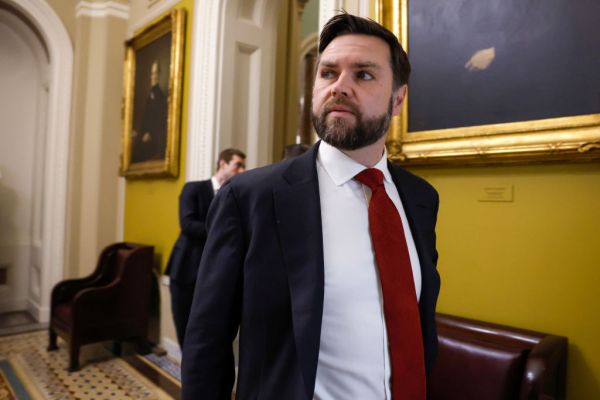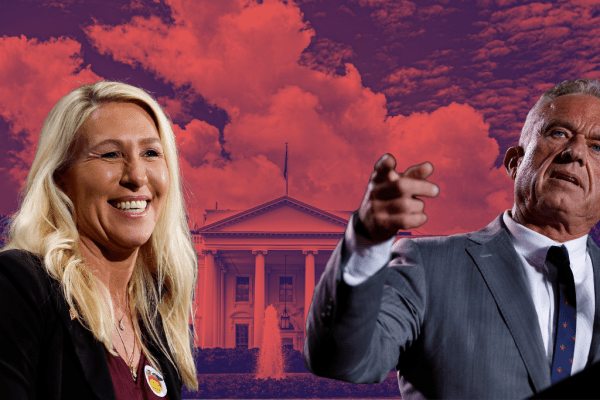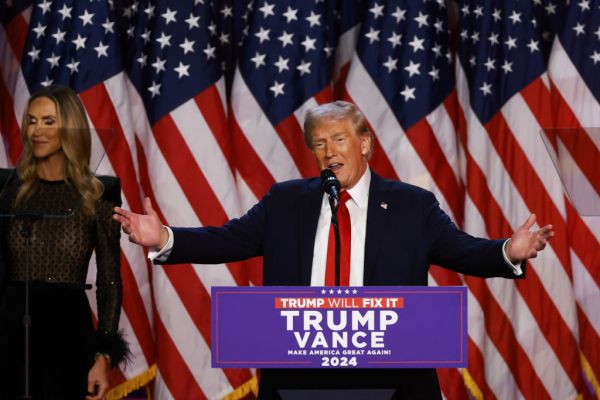A notable quotable from the newsiest event in Washington on Tuesday, our own Dispatch Summit: “I am very encouraged by the early appointments by the president-elect. These are all conservative men and women who will serve the country well.”
The speaker was Mike Pence. Given the way his time in office ended, you would think he’d be gloomier about the direction of a second Donald Trump term.
After all, the reason he wasn’t back on the ticket this year is because Trump wanted a vice president who won’t serve the country well, no?
Maybe the former VP is an optimist by nature. But insofar as his enthusiasm for Trump’s new Cabinet is based on something concrete, it probably boils down to two words: Marco Rubio.
Rubio is Trump’s surprise nominee to lead the State Department, leaving Reaganites who feared an isolationist America-First-er taking charge of U.S. diplomacy relieved to see the job go instead to a hawkish remnant of the pre-Trump era. Rubio has relevant experience in spades too, having served for years as the top Republican on the Senate Intelligence Committee.
If there’s any chance of preserving the Pax Americana, which there probably isn’t, it likely depends on having someone like him advising President Trump. You can understand why a principled conservative like Pence would be pleased to see him in the Cabinet and hopeful about what it portends.
But with all due respect, I think this misunderstands how Trump’s appointees will function in a second term. It also misunderstands Marco Rubio.
It’s tempting to slot Rubio into the “adults in the room” niche occupied in Trump’s first term by figures like James Mattis, John Kelly, Mike Pompeo, and Nikki Haley, offering wise (i.e. conservative) counsel to an “erratic” boss to stop him from lighting the planet on fire. But I don’t think that niche exists anymore. The “adults in the room” this time won’t be there to advise, they’ll be there to take orders and provide a respectable public face for whatever gonzo schemes Trump hatches.
As one Dispatch colleague said, Cabinet 2.0 is likely to function as a coterie of glorified press secretaries tasked with defending the actually meaningful decisions that are made in the West Wing. I suspect Rubio understands that. And that Pete Hegseth does too.
The perfect nominee.
Hegseth was tapped to lead the Pentagon on Tuesday evening, hours after Mike Pence sounded his note of optimism. I’m guessing he feels less optimistic now.
It’s not that Hegseth isn’t qualified for the job. The opposite, really: In many ways he’s the platonic ideal of a Trump Cabinet nominee. He “looks the part.” He’s a slavish Trump apologist. And he’s very good on television.
His career is a microcosm of the devolution of the American right. He attended Princeton and Harvard (the populist-in-chief has always had a thing for Ivy Leaguers) and served in the military. He was enough of a hawk during the Iraq War era to have helmed the group Vets for Freedom, which advocated for George W. Bush’s troop “surge” in 2007. Future Never Trumper Bill Kristol endorsed him when he ran for Senate in Minnesota in 2012.
That Senate run didn’t work out. A few years later Hegseth landed at Fox News and a few years after that Trump landed in (or, rather, on) politics. With two corrupting influences bearing down on him, Hegseth became the sort of populist whose strongest opinions on national defense have to do with “wokeness.” On the morning of January 6, 2021, he was live on the scene of Trump’s pre-insurrection rally reporting excitedly for Fox.
He’s never held a major leadership position that would reasonably qualify him to lead the U.S. military. His most notable contribution to defense policy during Trump’s first term came, ominously, when he lobbied the then-president to intervene on behalf of U.S. service members accused of being war criminals.
You can see why Trump likes him. He’s telegenic, has years of practice at propaganda, and has shown a ruthless streak in military conduct. That’s exactly what the new president wants at the Pentagon after the highest-ranking defense officials in his first term, former Defense Secretary Mark Esper and former Chairman of the Joint Chief Gen. Mark Milley, resisted his impulse to open fire on protesters. When Trump orders his new SecDef to politicize the officer corps by purging “woke” generals and replacing them with loyalists who’ll obey him unquestioningly—and that order may have already been drafted—he wants someone who’ll salute and not give a second thought to the implications.
Pete Hegseth will do that. Kristi Noem, Trump’s nominee to head the Department of Homeland Security, will do the same on immigration. She too is conspicuously telegenic, at home doing national media after endless appearances on Fox News, and famously possessed of a ruthless streak. “She is inexperienced but loyal, a political lightweight with no independent base of support or particularly long experience in Washington, and she can be counted on to do what she’s told,” Tom Nichols said of her in words that describe Hegseth just as well. It’s no coincidence that an authoritarian wants people like that in charge of his “bloodiest” business at the Pentagon and DHS.
Question: Is Marco Rubio really that different?
He’s more qualified than Hegseth and Noem are for the position he’s been offered, certainly. But Trump doesn’t want Rubio at State because he’s keen to build a “team of rivals” stocked with Reaganites who’ll challenge his thinking on foreign policy. He’s building a team of loyalists who won’t challenge him. Rubio and Michael Waltz, Trump’s pick for national security adviser, spent most of their careers as hawks but have been at pains recently to signal their newfound allegiance to America-First-ism. Each contrived reasons to oppose the latest military aid package to Ukraine, in fact, with Rubio complaining that immigration should come first and Waltz questioning the White House’s strategic objectives.
Like Noem and Hegseth, Rubio will do what he’s told. That’s why opposition to his nomination has been muted in MAGA circles, I assume. They know he’s a Reaganite at heart and find him suspicious for that reason, but the great fear of an “adult in the room” converting Trump to his or her worldview is absent this time. It’s not Trump who’s moved toward Rubio’s foreign policy, it’s Rubio who’s moved toward his.
Populists have spent eight years watching the senator’s hawkish impulses being slowly ground down by his partisan duty to to defend their hero in increasingly obeisant, humiliating ways. In February Rubio stooped to spinning Trump’s threat to let Russia invade NATO countries by feebly objecting that “he doesn’t talk like a traditional politician.” A toady pitiful enough to do that is pitiful enough to do anything.
In March I considered the rumors of a Trump-Rubio ticket and said this: “Any ‘respectable’ Republican who chooses to ride the Trump carousel [by joining his next administration] will do so knowing that the price of admission is agreeing to behave less scrupulously than Mike Pence did on January 6 if and when called on to do so. Some ambitious figures have made that pledge explicitly; everyone who joins the administration will be making it implicitly. No one who serves in the next Trump government will do so with honor.”
I don’t know if Pence himself realizes that, per his comments at the Dispatch Summit. But I bet Marco Rubio, a telegenic politician who’s quite good on TV, does.
Three-dimensional chess.
On Tuesday, Nichols speculated that Trump front-loaded his Cabinet announcements by revealing the less objectionable nominees first and saving the indefensible ones for later. Rubio at State, John Ratcliffe at CIA, Lee Zeldin at EPA, Elise Stefanik as ambassador to the United Nations, and Mike Huckabee (a Fox News alumnus who’s good on television!) as ambassador to Israel: We can argue over whether these picks are “good” but it’s hard to argue that any are dangerous. Even Ratcliffe, a Trump crony, gained relevant intelligence experience in Trump’s first term.
Nichols fears it’s a smokescreen. “I am concerned that this first pass is a head fake, in which Trump nominates people he knows are controversial (such as Zeldin) but who are still confirmable, and then sends far worse candidates forward for even more important posts,” he warned.
Hours after he wrote that, Trump shocked Washington by naming Hegseth his nominee for the Pentagon. (“Who the f— is this guy?” one mystified defense lobbyist told Politico afterward.) Then Semafor reported that the president-elect intends to nominate uber-crank Robert F. Kennedy Jr. for a major Senate-confirmable office rather than stick him in the West Wing as an adviser. As I was writing this on Wednesday afternoon, Trump announced that his director of national intelligence will be Tulsi Gabbard, yet another telegenic good-on-TV crank with a curious history of freelance diplomacy with Bashar Assad and a taste for Kremlin propaganda. And then he announced that his attorney general will be—wait for it—Matt Gaetz, who’s not so telegenic but very, very good on TV.
Was Nichols right? It sure seems like he was right.
I don’t know, though. Believing that Trump chose to roll out his nominees in a deliberate sequence gives him too much credit for strategic thinking, frankly. I don’t think he’s playing three-dimensional chess. If anything, it’s one-dimensional.
Why, for instance, would he feel the need to introduce his more credible nominees before introducing his less credible ones? The idea that he’s trying to butter up Senate Republicans to support dubious candidates like Hegseth, Gabbard, and Gaetz by offering them competent figures like Rubio is wildly inconsistent with his persona. A victorious strongman doesn’t believe that he needs to horse-trade with Congress. He believes that he owns his party and the government and that his allies in the Senate should get out of his way.
That was the point of his announcement last weekend that he expects the Senate to facilitate recess appointments for vacancies in the executive branch. Typically the president doesn’t start thinking about recess appointments until well into his term, and only then if the opposing party has managed to delay or block confirmation of his nominees. That won’t be the case next year. Republicans will have 53 seats, which means they’ll control the floor. And since filibuster rules no longer apply to presidential appointments, Trump’s candidates can be confirmed by simple majority without Democratic votes.
He shouldn’t need recess appointments. The fact that he’s leaning into them anyway amounts to nothing less than asking Senate Republicans to help him consolidate power. He wants them to ditch their constitutional duty of advice and consent on presidential nominees and let him appoint whoever he likes, without Senate input, through the recess mechanism. Some of his nominees, like Hegseth, might be so grossly unqualified that even a compliant Republican majority would be reluctant to confirm them; the “recess appointment” gambit is his invitation to those reluctant legislators to cede to him, the authoritarian executive, full responsibility for ensuring that Cabinet members are fit to serve.
That’s not a man who cares about buttering anyone up. That’s a man who’s going to get what he wants whether the Senate likes it or not. If Hegseth or Gabbard or Gaetz can’t earn 51 votes initially, Trump will browbeat and threaten the GOP majority until they acquiesce. And if they surprise us all by holding out, he’ll either recess-appoint the nominee or use some procedural sleight of hand to put him or her in charge in an “acting” capacity like he did with other officials in his first term.
I’m likewise skeptical that Trump chose Rubio for State reluctantly, as a sop to the right’s “sane” conservative faction in hopes of purchasing their support for less sane nominees. There’s simply no meaningful “sane” faction left, and insofar as there is, it doesn’t require appeasing; on Election Day, Trump’s share of the Republican vote was only 1 point less than Kamala Harris’ share of the Democratic vote. Whatever misgivings the Reaganites at Mar-a-Lago or in the American heartland might have about Pete Hegseth or Tulsi Gabbard of Matt Gaetz, they’re not going to do a thing about it. And Trump knows it.
One-dimensional chess.
The straightforward one-dimensional-chess explanation for why he chose Rubio, Stefanik, and the rest is that they’ve been devoted bootlickers and he wanted to reward them for it. There’s nothing more complicated to it than that.
Trump will be giving the orders on foreign policy in consultation with J.D. Vance and Tucker Carlson, so why would he obsess over who holds America’s formal diplomatic positions? As long as they’re good on television and have proven themselves willing to defend anything he does, they’re qualified.
Rubio and Stefanik fit the bill. Trump probably rolled out their nominations early simply because they were easy picks. Possibly he relished the fact that both, like Vance, criticized him harshly during his early days in politics before becoming sycophants; seeing a Never Trumper bend the knee has always seemed to tickle him. Or maybe he likes the idea of Rubio and Stefanik as foreign-policy mouthpieces because they’ve spent most of their careers as hawks and he’s hoping to leverage their credibility with hawkish voters to sell his dovish, isolationist policies.
In Rubio’s case, the logic might be even simpler. Getting him out of the Senate will create a vacancy in Florida which Team Trump is plainly hoping to see filled by RNC Chair (and presidential daughter-in-law) Lara Trump. The White House could gain functional control of a Senate seat in the country’s third-most populous state if it succeeds in putting Rubio in the Cabinet, which it assuredly will.
Even if Secretary Marco turns out to be less simpatico to Trump’s agenda than I expect, the president can always do what he did to figures ranging from James Comey to Jeff Sessions to Rex Tillerson in his first term and fire him. How’s this for three-dimensional chess: What if Trump wants Rubio at State because he knows he’ll be confirmed easily and can then be fired and replaced at any time by a zombie loyalist as “acting secretary” who’s more to Trump’s liking, like Kash Patel?
If you doubt that he’s playing one-dimensional chess with even the “bloodiest” arms of his administration, sit with this report on Tuesday from Semafor’s Shelby Talcott: “Seems like Pete Hegseth as Secretary of Defense deal came together very quickly: Per source familiar, he was called yesterday and interviewed for the position today.”
Trump likes Hegseth, appreciates his bootlicking, and admires his ruthless advocacy for accused war criminals. What more did he need to know to put him in charge of the U.S. military except whether he wanted the job?
Because of Trump’s authoritarian ambitions, it may be that his appointees end up wielding less influence over policy than those of any president in recent American history. All “deals” on domestic and foreign policy can and probably will be brokered by the West Wing. The Cabinet will simply need to be good on television.
So as he continues to roll out nominees, I recommend treating them not as cause to wonder how a particular department will function but as cause to wonder just how humiliated the nominal head of that department will end up. The world’s richest man, at risk of upstaging America’s main character, has already been shunted off to a pretend “department” that will function as a toothless deficit commission and may amount to little more than an excuse to post memes. We’re eight days removed from the election and already a top Trump deputy has cause to feel embarrassed. He won’t be the last.










Please note that we at The Dispatch hold ourselves, our work, and our commenters to a higher standard than other places on the internet. We welcome comments that foster genuine debate or discussion—including comments critical of us or our work—but responses that include ad hominem attacks on fellow Dispatch members or are intended to stoke fear and anger may be moderated.
With your membership, you only have the ability to comment on The Morning Dispatch articles. Consider upgrading to join the conversation everywhere.